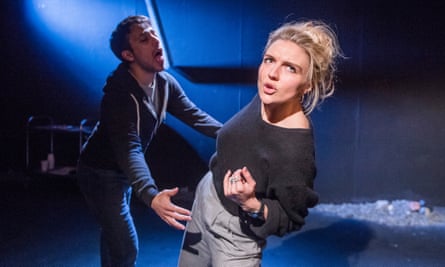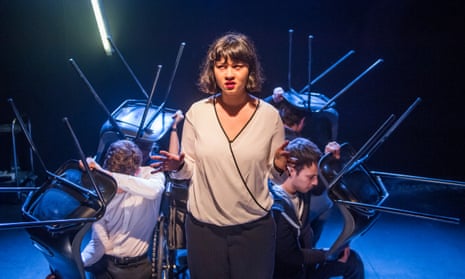How would we react to a future terrorist attack? What impact would it have on our lives and personalities? Those are just two of the questions raised by this extraordinary new play by Stuart Slade, which arrives in the West End after an acclaimed run at Theatre 503. It even questions our own complicity in seeking entertainment in stories about a horrific disaster.
Slade’s play takes the form of what in TV terms would be called a mockumentary. We seem to be watching a verbatim piece in which six members of a survivors’ group relive their reaction to an attack in which a passenger plane has been brought down over Fulham, southwest London, by a surface-to-air missile. Although the story is told through interlocking monologues, the six characters, who take their names from the actors, seek to form mutual bonds. Alex, an arrogant banker whose girlfriend has died in the disaster, hooks up with Izzy, who has lost her mother. Floss, a posh student, is linked by bizarre circumstances to Clive, a devout Muslim whose cardiologist dad died in the crash. Roxana, a Romanian with severe burns, secretly despises Graham, a bigoted van driver who profits from his eyewitness account of the event.

I was reminded of Neil LaBute’s The Mercy Seat, which showed two New Yorkers exploiting 9/11 for their own ends. But Slade’s play is much stronger than LaBute’s in that it suggests terrorist attacks soon acquire their own mythology. Alex may be a merciless cynic who tells us “a survivors’ group is a perfect place to pull” but Slade’s larger point is that, as individuals and societies, we cope with disaster through a series of pretences. London – like most big cities – is full of deep divisions of class, income and religion but Slade suggests any external threat fosters a bogus solidarity. The real surprise about his play, however, is that it is unafraid to provoke wild laughter in the face of death. Even if Alex’s running commentary on the action is over-used – especially when he mocks our assumption that the young Muslim may be a terrorist conspirator – it gives the play an added zest and brio.
Dan Pick’s production, with its plastic chairs and strip lighting, reinforces the feeling that we are watching an authentic group confessional and the six actors highlight the way crisis breeds a strange mix of selfishness, grief, resilience and opportunism. Since it would be invidious to pick out any single performer, I would simply pay joint tribute to Alexander Forsyth, Clive Keene, Florence Roberts, Graham O’Mara, Isabella Laughland and Roxana Lupu. It is fascinating to learn that Slade himself is creative director of a film company that specialises in documentaries about disaster response. I can only say that he has turned his knowledge to excellent use and created a play that questions our assumptions about collective heroism and makes fascinating drama out of personal trauma.
- At Trafalgar Studios, London, until 18 February. Box office: 0844 871-7632.

Comments (…)
Sign in or create your Guardian account to join the discussion